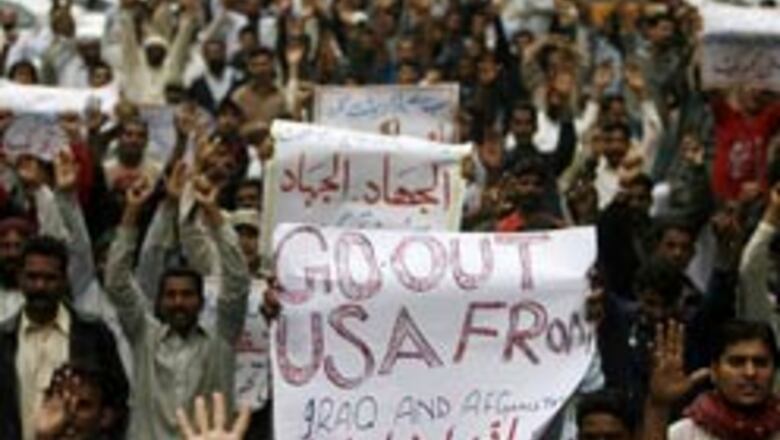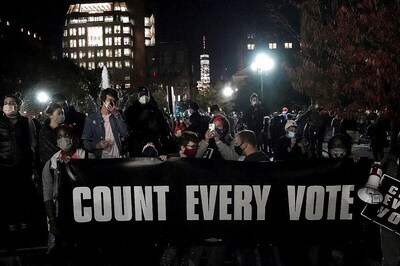
views
Washington: The US government is asking Pakistan "every single day" to act against those involved in the Mumbai terror attack and has warned it to be especially vigilant against more incidents till Barack Obama takes over as the American President, officials said.
At the same time, US Secretary of State Condoleezza Rice said ungoverned spaces of Pakistan together with the difficult-to-defend Afghan border have compounded the problem of fighting terrorism in South Asia.
State Department spokesman Sean McCormack said on Monday that the US is asking Pakistan "every single day to do whatever it can" to track down those responsible for the Mumbai terror strikes and prevent future terrorist attacks, but would leave it to Islamabad how to bring them to justice.
"Well, the specific arrangements for bringing to justice those responsible for these attacks is something that Pakistan is going to have to deal with, and then they should be talking to the Indian government about this," he told reporters.
"They have populations that are affected by it. And certainly, we would have concerns about that as American citizens were murdered in these attacks," he said when asked if the US would pressurise Islamabad to hand over suspected terrorists as demanded by India.
"So we are still at the stage where we are urging Pakistan every single day to do whatever it can to prevent future attacks and to track down and get off the street those responsible for these attacks," McCormack said, declining to offer any "policy prescriptions".
"We will get to a stage at some point where, you know, we look very closely at exactly what is the final disposition of these individuals who have been arrested over time.
"So I can't offer a specific policy prescription for you at this point, but it is important that Pakistan and India continue to talk and to work through any differences through dialogue and diplomacy that they might have, and that every single day Pakistan focus on the task at hand, and that is to prevent any further attacks," he said.
Meanwhile, White House spokesman Tony Fratto said the US takes the period of transition to the Barack Obama administration "very seriously" and has communicated to Pakistan "very well" about their important responsibility and role on terror.
"I think I would just say we do take the period of transition very seriously," Fratto said when asked if the US was on high alert as terrorists may take advantage of the transition from President George Bush to president-elect Obama.
"As for Pakistan, we're communicating with them very well, and I think they understand their responsibility and the important role they play...," he said referring to warnings from Bush, Obama and other US leaders in this regard.
Fratto said: "We need to try to defeat terrorists in every way possible, be that through the use of armed conflict, by taking the fight to them, using our intelligence services to try to prevent attacks, and when we do find those who have committed attacks, to bring them to justice.
"And we've assembled a large coalition of nations who stand with us in trying to defeat terrorism. Again, we do it on the intelligence side; we do it on the financial intelligence side, trying to track the money.
"It's a global effort and we have to try to be right all the time, and bring anyone who plans or carries out a terrorist attack to justice."
Outgoing Secretary of State Condoleezza Rice meanwhile said in an interview that there was a "problem" in South Asia that needed to be closely looked at "a kind of coming together of the ungoverned spaces of Pakistan with the difficult-to-defend Afghan border."
According to the transcript of an interview released by the State Department Monday, Rice told the news agency AFP: "But I do not think that it would be right to say that they are unchallenged there or they're somehow on the march."
Rice refuted suggestions that Taliban and other militants seemed to have the initiative, going by the terror attacks in India and from across Pakistan's porous border with Afghanistan.
Admitting "they're (terrorists) able to do hit-and-run attacks across that (Pakistan-Afghanistan) border," she said: "The capacity of the Afghan Government has to be strengthened, and the Pakistanis need to continue to press in those ungoverned spaces."
In a separate interview with the Financial Times last week, Rice reiterated that Pakistan has got to do "everything that it can" to help bring the perpetrators of the Mumbai terror attacks to justice and find out "as much as they possibly can" to prevent a follow-on attack of some kind.
Rice said Pakistan also had to "make sure they know as much as they possibly can so that you don't have a follow-on attack of some kind".
Talking about the problem of fighting terrorism in Afghanistan, Rice said: "Afghanistan has two problems that Iraq does not, and one is that it's desperately poor. ...The other problem is the safe haven across the border. And there, the stability and activity of Pakistan becomes key."
The top US diplomat said former Pakistan President Pervez "Musharraf, after 2001, did a lot to try and rid Pakistan of extremism. But it's very deeply buried in that country. It goes all the way back to (former president) Zia-ul-Haq."
















Comments
0 comment